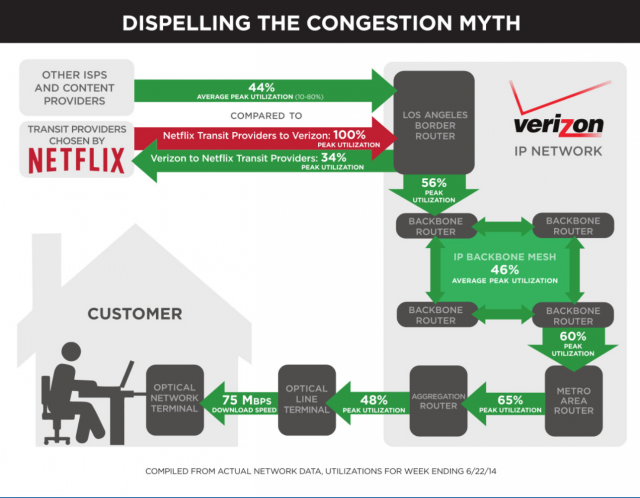
It’s been 10 weeks since Verizon and Netflix struck a deal in which Netflix will pay the ISP for a direct connection to its network.
Yet customers are still complaining about bad performance. The reason is that Verizon and Netflix haven’t set up enough connections to make much of a difference, and Verizon has said work may not be completed until the end of 2014.
Instead of remaining quiet while they build out the necessary infrastructure, Netflix and Verizon have taken shots at one another. The latest comes from Verizon VP David Young, who wrote a blog post today that aims to dispel what he calls “the congestion myth.”
“A few weeks ago, Verizon received an e-mail from a customer in Los Angeles asking why he was not getting a good experience watching Netflix on his 75Mbps FiOS connection,” Young wrote. “He was understandably confused by some of the misleading public accounts that inaccurately suggest widespread congestion that could affect Netflix traffic on Verizon’s network. Worse still were claims that Verizon is deliberately 'throttling' Netflix traffic. This customer wanted to know what was going on and why his performance wasn’t what he hoped. We, too, wanted to get to the bottom of the problem.”
Young went on to say that there is “no congestion anywhere within the Verizon network” but that there is congestion in the links between Netflix’s transit providers and Verizon.
Those links, of course, haven't being upgraded because transit providers such as Cogent refused to pay Verizon to build out extra infrastructure. Instead, Netflix eventually agreed to pay for a direct connection, which should eliminate the transit providers' role in bringing traffic from Netflix to Verizon.
Verizon's infrastructure squad moves slowly
Netflix also agreed to pay Comcast for a direct connection, and performance on that network improved almost immediately after the deal was announced. So why, 10 weeks after the Netflix/Verizon deal, is there still congestion at interconnection points?
As we reported last month, Comcast was able to establish the connections quickly because it spent months working with Netflix to prepare the necessary infrastructure even before the companies agreed to monetary terms. That includes a few hundred 10 Gigabit Ethernet ports spread across 10 carrier-neutral Internet exchange points.
Compared to Comcast, Verizon’s infrastructure team was unprepared for the deal. In June, a Verizon statement said, “we will be incrementally rolling it out starting next month and progressing through the fourth quarter.” At the time, Verizon and Netflix had set up a test connection in Dallas and were working on setting up peering connections in 13 cities.
The connections apparently aren't ready yet, and Young today blamed Netflix for continuing to send traffic over congested links. It’s customary for Verizon to “negotiate reasonable commercial arrangements with transit providers or content providers to ensure a level of capacity that accommodates their volume of traffic," he wrote. “Such arrangements have been common practice for content delivery networks in the Internet ecosystem for many years, and Netflix is fully capable of taking the necessary and customary steps to ensure that its connections match its traffic volumes."
That’s true as far as it goes, but the statement doesn’t mention that Netflix already capitulated to Verizon's terms more than 10 weeks ago.
We asked Verizon spokespeople today how much progress has been made setting up the connections but the company declined comment. Young’s blog post didn’t shed any light on when significant numbers of customers can start seeing improvements.
“We are working aggressively with Netflix to establish new, direct connections from Netflix to Verizon’s network,” Young wrote. “The benefit of these direct connections will be two-fold. First, Verizon customers who use Netflix will have a significantly improved experience as Netflix traffic flows over non-congested links. Early tests indicate that this is the case. The other benefit will be that the congestion that we are seeing today on those links between these middleman networks and our L.A. border router will likely go away once the huge volume of Netflix traffic is routed more efficiently. This will improve performance for any other traffic that is currently being affected over those connections.”
Netflix has tried to rally customers to its cause, telling people who experience streaming trouble that “The Verizon network is crowded right now.”
Today, the company repeated its call for rules that prevent ISPs from charging interconnection fees to content companies.
“We'd like to thank Verizon for laying out the issue so nicely,” a Netflix spokesperson said in a statement sent to Ars. “Congestion at the interconnection point is controlled by ISPs like Verizon. When Verizon fails to upgrade those interconnections, consumers get a lousy experience despite paying for more than enough bandwidth to enjoy high-quality Netflix video. That's why Netflix is calling for strong net neutrality that covers the interconnection needed for consumers to get the quality of Internet they pay for.”
Netflix did not offer any update on when the peering links with Verizon will be established.
reader comments
196